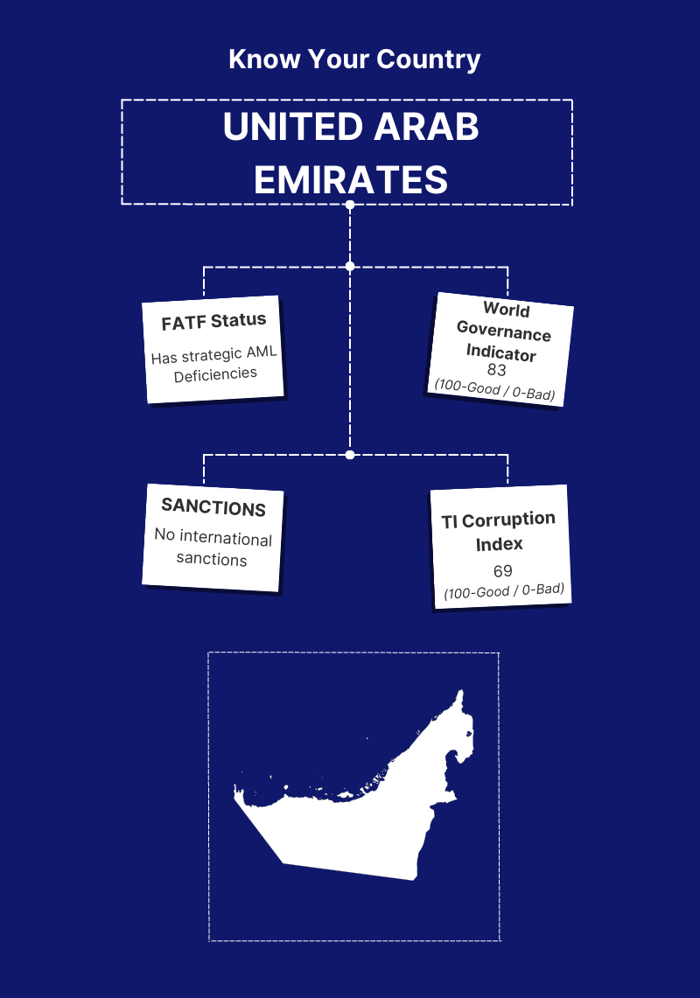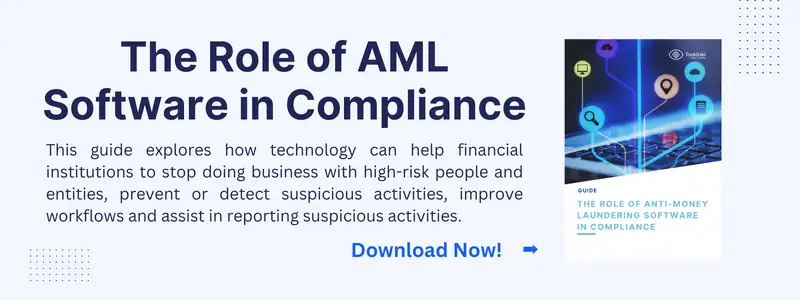Impact of AML Compliance on Business Reputation and Trust in the UAE
In the world of finance and banking, Anti-Money Laundering (AML) compliance plays a pivotal role in safeguarding the integrity of markets and financial institutions. AML refers to a set of laws, regulations, and procedures designed to prevent criminals from disguising illegally obtained funds as legitimate income. Through numerous methods like structuring, bulk cash smuggling, and trade-based laundering, ill-gotten gains can be 'cleaned' and made to appear as lawful earnings. AML compliance is a concerted effort by financial institutions to detect, report, and prevent these illegal activities, adhering to guidelines set by global and local regulatory bodies.
For businesses in the United Arab Emirates (UAE), AML compliance has taken on increased significance. As one of the major global financial hubs, the UAE is committed to enforcing rigorous AML measures to uphold its financial integrity and combat financial crime. Non-compliance with these regulations can result in severe penalties, including hefty fines and damage to a business's reputation. Therefore, businesses, especially those in the financial sector, need robust AML programs to meet the regulatory requirements and protect their operations.
Beyond merely adhering to regulations, AML compliance plays an integral role in shaping a business's reputation and fostering customer trust. In today's information-rich age, where transparency and corporate ethics are paramount, businesses can ill afford the reputational damage that comes with AML violations. Furthermore, a strong AML program signals to customers that a business is trustworthy and operates with integrity and instils confidence in stakeholders that the business is resilient against financial crime risks. In essence, AML compliance is a key pillar in building and maintaining the reputation and customer trust that are vital to a business's success.
The UAE Regulatory Landscape
Overview of AML Regulations in the UAE
The UAE has a comprehensive AML framework in place to thwart the illegal laundering of money. The cornerstone of this framework is the Federal Law No. 20 of 2018 on Anti-Money Laundering, Combating the Financing of Terrorism and Financing of Illegal Organizations. This legislation outlines the country's commitment to international standards, incorporating recommendations from the Financial Action Task Force (FATF), an international body that sets guidelines to combat money laundering and terrorist financing.
The Central Bank of the UAE also plays a vital role in AML oversight, issuing regulations that financial institutions must adhere to. Additionally, the UAE has established the Financial Intelligence Unit (FIU) and the National Committee for Combating Money Laundering and the Financing of Terrorism and Illegal Organizations to strengthen its AML stance further. The UAE is actively evolving its regulatory framework to accommodate the rapid progression of its business landscape and to solidify its position as a global investment powerhouse.
Compliance Requirements for Businesses
Businesses operating in the UAE, particularly those in the financial sector, must establish robust internal procedures to ensure AML compliance. These include implementing customer due diligence (CDD) processes, maintaining records, regularly training staff on AML procedures, and reporting any suspicious transactions to the UAE's Financial Intelligence Unit (FIU).
Furthermore, businesses need to undertake regular risk assessments to identify and mitigate potential AML risks. They should also appoint a Compliance Officer at the managerial level to oversee the AML program's effectiveness and to liaise with the regulatory authorities. Furthermore, recent updates to the Companies Law mandate businesses, irrespective of their nature, to adapt to the changing landscape. From June 2021, these amendments allow for 100% foreign ownership, introducing further compliance requirements for businesses.

Penalties and Consequences for Non-Compliance
The UAE authorities impose strict penalties and consequences for non-compliance with AML regulations. These can range from administrative and financial sanctions to restrictions on operations, suspension, or revocation of licenses. Financial penalties can be particularly hefty, with fines reaching up to AED 50 million. Non-compliant businesses also risk significant reputational damage, which can lead to a loss of trust among customers and stakeholders, resulting in potential business loss.
Aside from the regulatory penalties, businesses also risk significant reputational damage. AML violations can lead to a loss of trust among customers and stakeholders, resulting in a potential loss of business. Therefore, adherence to AML compliance is not just a regulatory obligation but a crucial component of maintaining a business's standing and credibility in the marketplace.
Impact of AML Compliance on Business Reputation
Businesses with a robust AML compliance framework experience a positive impact. Let's take the example of HSBC, one of the world's largest banking and financial services organizations. Following substantial fines due to AML violations, HSBC launched a massive overhaul of its AML compliance program. Their commitment to rectifying past mistakes and implementing a robust compliance system has significantly improved their reputation, restored client trust, and enhanced shareholder value.
TransferWise (now known as Wise), a UK-based money transfer service, has made transparency and compliance its selling points. By prioritizing AML compliance and customer security, Wise has built a reputation as a trustworthy alternative to traditional banks, which has been a key factor in its rapid growth.
The effects of non-compliance with AML regulations can be devastating for a business. For example, Danske Bank, Denmark's largest bank, faced a severe reputational crisis due to an enormous money laundering scandal involving its Estonian branch. This scandal not only resulted in hefty fines but also caused a significant loss of customer trust and a sharp decline in its market value.
Read More: Navigating Reputational Risk: Prevention and Management Insights
Role of AML Compliance in Building Corporate Integrity and Credibility
AML compliance plays a crucial role in building and maintaining corporate integrity and credibility. Businesses can foster trust among their clients, partners, and the wider public by demonstrating a commitment to ethical practices and a robust compliance framework. This helps protect them from the financial and legal risks associated with money laundering and associated crimes and contributes to a positive corporate image.
Furthermore, a robust AML compliance program can provide a competitive edge in the market. In an increasingly globalized and interconnected business environment, customers, partners, and regulators value businesses that prioritize regulatory compliance and corporate responsibility. Therefore, AML compliance is a legal obligation and a vital component of a business's reputation management strategy.
Impact of AML Compliance on Customer Trust
AML compliance is more than a regulatory requirement—it's a statement of a business's commitment to ethical and lawful practices. When businesses adhere to strict AML guidelines, they communicate to their customers that they prioritize legal and ethical operations over quick profits.
Customers need to trust that their financial assets are safe and that they are not unknowingly contributing to illegal activities such as money laundering. A robust AML compliance program provides this assurance, bolstering customer confidence in the integrity of the business.
Transparency plays a pivotal role in building and maintaining customer trust. By being open about their AML policies, procedures, and controls, businesses show customers that they have nothing to hide. This openness extends to the way businesses handle customer transactions. Informing customers about the necessary AML checks, explaining why they are essential, and ensuring that these checks are carried out professionally and respectfully, contributes significantly to building trust.
Transparency also involves openly addressing any past AML failures and detailing the steps taken to rectify these issues. This kind of honesty shows customers that the business is committed to continual improvement and learning from its mistakes.
The Role of Technology in AML Compliance
The rapidly evolving financial landscape, coupled with increasingly sophisticated criminal activities, has made it more challenging than ever for businesses to stay on top of their AML obligations. Traditional methods of monitoring transactions and identifying suspicious activities are no longer sufficient. This is where technology comes in.
Advanced technologies such as Artificial Intelligence (AI), Machine Learning (ML), and data analytics are revolutionizing the way businesses approach AML compliance. These technologies can analyze vast amounts of data at high speed, helping businesses to detect patterns and anomalies that might indicate fraudulent activities.
AI and ML algorithms can also learn from past transactions and adapt to new money laundering strategies, making them incredibly effective at spotting potential risks. Furthermore, technology can help automate many of the labour-intensive processes associated with AML compliance, such as customer due diligence and transaction monitoring, freeing up staff to focus on more strategic tasks.
How Tookitaki’s AML Suite Helps Financial Institutions
Founded in 2015, Tookitaki aims to create safer societies by tackling the root cause of money laundering. As a global leader in financial crime prevention software, the company revolutionises the fight against financial crime by breaking the siloed AML approach and connecting the community through its two distinct platforms: the Anti-Money Laundering (AML) Suite and the Anti-Financial Crime (AFC) Ecosystem. Tookitaki's unique community-based approach empowers financial institutions to effectively detect, prevent, and combat money laundering and related criminal activities, resulting in a sustainable AML program with holistic risk coverage, sharper detection, and fewer false alerts.
Tookitaki's AML Suite is a shining example of how technology can aid in effective AML compliance. It provides a range of features designed to streamline and enhance AML processes. These include advanced transaction monitoring, which uses pattern-based detection to identify potentially suspicious transactions and an intelligent alert management system that helps reduce false positives and improve the efficiency of investigations.
Tookitaki's AML solution also offers a smart customer risk rating module. It uses a data-driven approach to accurately assess the risk associated with each customer, helping businesses to understand better and manage their risk exposure. Also, the AML Suite provides a name-screening module for all watchlist screening needs. It enables entity screening during onboarding and on an ongoing basis and payments screening against sanctions lists.
With its advanced technology and user-friendly design, Tookitaki's AML Suite helps businesses meet their regulatory obligations and instils confidence in their customers that they are committed to maintaining a safe and transparent financial environment.
Wrapping Up: The Imperative of AML Compliance and the Future
Throughout this exploration, it has become abundantly clear that AML compliance is not just about fulfilling regulatory obligations – it's vital to building a credible business reputation and fostering customer trust. Strict adherence to AML regulations signifies that businesses are committed to combating financial crime and are dedicated to protecting their customers' interests. These factors inevitably contribute to a positive business reputation and enhance customer trust in the organization.
Looking ahead, the role of technology in AML compliance is set to increase. As financial crime schemes become more sophisticated, businesses will need to leverage advanced technologies like AI and ML, even more, to stay one step ahead. The need for real-time risk assessment and predictive analytics will grow, and organizations must look beyond merely reactive measures to a more proactive and dynamic approach to AML compliance.
To maintain your business's reputation and trust and to prepare for the future of AML compliance, it's critical to invest in robust AML solutions. Book a demo for Tookitaki’s AML Suite today to see how its advanced technology can streamline your AML processes and strengthen your commitment to combating financial crime.
Anti-Financial Crime Compliance with Tookitaki?




